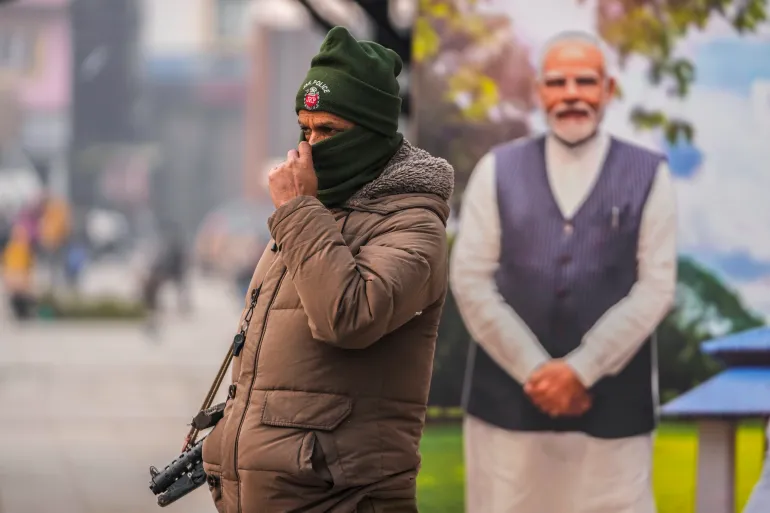
As India embarks on another electoral journey, the electorate must reckon with the dark underbelly of Indian democracy, the oppression and subjugation of Kashmiris in the name of national security. With the 2024 Indian General Elections knocking on the door, the present state of Indian Illegally Occupied Jammu and Kashmir (IIOJ&K), overseen by the Indian Government bears the brunt of the political crisis that arose from the dissolution of the State Assembly in 2018. While the Central government offers reassurance, the prospect of shaping a Legislature Assembly after the election, remains a distant dream. Hence the fate of democratic representation is also uncertain.
The abrogation of Article 370, robbed the region of its unique status.
The BJP’s narrative of growth following the abrogation of Article 370, which robbed the region of its unique status, has attempted to eclipse Kashmiris’ aspirations for self-determination and autonomy, pushing their demands to the margins of political debate. There is a discrepancy between the slogans of development and prosperity and the lingering sorrow of the Kashmir people. From cases of extrajudicial killings and forced disappearances to torture and sexual violence, human rights violations by Indian Security Forces continue to leave a mark of atrocity on Kashmiris’ subconscious and collective memory.
The International Community: A Complicit Spectator
As the global community keenly watches the upcoming India 2024 Elections, no one is holding the Modi Government accountable for the blatant human rights violations in IIOJ&K. While there are sporadic instances of occasional condemnation, but the diplomatic interests always gain more prominence than the moral imperatives. This injustice results in a bitter solution for the Kashmir masses who perpetually face state-sponsored suppression. The United Nations (UN), which was seen as a hope for the suppressed people at one time, stands helpless against India’s obstinacy. Moreover, the failure of the world governance system in the face of humanitarian crises also gets exposed.
The Socio-Economic Impact of Article 370 Abrogation
The abrogation of Article 370, which was a provision of what amounted to special autonomy for Jammu and Kashmir was portrayed by the Modi Government as a milestone in the efforts to inherit a united India. However, the claimed advantages do not come into the hard life of the people of Kashmir, who have paid a very heavy price for the security clampdown and economic downfall with lives spent just in fear.
Unemployment rate in Jammu and Kashmir has jumped to 18.3%, during 2023.
The true picture on the ground lags far behind the exalted aspirations of progress and well-being, raising fears of joblessness, economic inertia and the threat of social instability in the region. Thus, the promise of development rings hollow in the face of systemic violence and denial of basic rights. The promises of employment opportunities have failed to appeal to the youth of Kashmir who are dissatisfied with the government as the unemployment rate in Jammu and Kashmir has jumped to 18.3%, during 2023. In addition, the persisting security clampdown and the limitations imposed on mobility and communication have also deepened the economic troubles.
Also Read: Kashmir’s Dilemma: Nehruvian Blunders or Modi’s Policies
A Legacy of Discontent: The Struggle for Self-Determination
The Kashmiri people experienced the hard regime of India which increased segregation, isolation, and alienation in the population, creating incessant distrust of Indian democracy. The deep-rooted denial of basic rights and freedoms, and the impunity of Indian security forces, have damaged the trust of the people in the Government while giving rise to the separatist movement in the region. To bring about permanent peace in the Kashmir region, it is essential to act on the main hindrances of the conflict and hold meaningful discussions with all the regional players, while upholding the right of self-determination of the Kashmiri people.
Conclusion: Towards a Just and Peaceful Future
Conclusively, the Indian General Elections represent the striking contrasts that are intrinsic to the country’s democracy as the people living in Kashmir are silenced by the noise of political anthems. It is high time that India should come to terms with its past and chart a course towards the truth and justice, or else it will find itself being stained with unfairness and injustice labels, which can tarnish its already fragile democratic image on the world scene. The future of Kashmir remains unclear, awaiting a spark of belief to shine up on the frightening dark side resulting from the prolonged oppression and injustice. While the world sits and watches, let our voice be heard and stand with the people in their struggle for freedom, dignity, and the right to self-determination.
The opinions shared in this article reflect the author’s personal views and do not necessarily align with the institution’s official stance.



















Leave a Reply